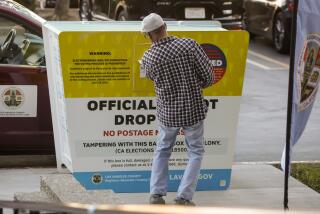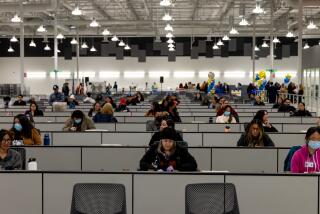Bill allows Californians to register to vote on election day
SACRAMENTO — Californians eventually will be allowed to register to vote on election day — though not this year — and they will get more information on who is trying to influence their vote, under bills signed Monday by Gov. Jerry Brown.
This week is Brown’s last to act on proposals sent to him by the Legislature in the session that ended last month. He put his signature on 27 measures Monday and has several hundred more on his desk.
California will join 10 other states, including Connecticut, Idaho, Minnesota and Wisconsin, that allow some form of election-day registration. The governor said the measure is a way to increase voter participation.
“Voting — the sacred right of every citizen — should be simple and convenient,” Brown said in a statement.
Current law says voters must register at least 15 days before an election. The new measure becomes law Jan. 1 but will not be implemented until after the California secretary of state begins operating VoteCal, a long-delayed state voter database that will allow officials to check whether an applicant is already registered in another county.
VoteCal is not expected to be up and running until 2015, said Nicole Winger, a spokeswoman for the secretary of state.
Many Republican lawmakers opposed the change. Assemblyman Tim Donnelly (R-San Bernardino) said that, combined with California’s new online voter registration system, it would lead to voter fraud.
“Along with the new motor-voter process of registration, same-day registration and the new online registration system, our elections are becoming less and less secure,” Donnelly said.
Assemblyman Mike Feuer (D-Los Angeles), author of the bill, AB 1436, noted that it increases penalties for fraud.
Brown also signed a measure Monday that was proposed by the state’s campaign watchdog agency to shed more light on political committees that operate independently from candidates to sway voters.
The new law requires such committees, which spend money on campaign ads and mailers separately from the candidates they support, to identify those in charge so they can be held liable for any violations of the law.
Other provisions sought by the state Fair Political Practices Commission include a requirement that the names of the campaign committee and its top two donors of $50,000 or more be identified in newspaper ads and on billboard ads.
“We’re expecting that this will provide much greater disclosure and a greater ability for us to enforce the law involving ‘super PACs’ and other independent expenditure committees,” said Ann Ravel, chairwoman of the state commission.
Assemblyman Rich Gordon (D-Menlo Park) introduced the bill, AB 481, which also requires faster reporting of independent expenditures exceeding $1,000.
Brown signed a bill requiring California lobbyists and politicians to pay more to register with the state. The money will pay for modernization of its website for public reporting of campaign contributions and lobbying activity.
Sen. Leland Yee (D-San Francisco) proposed the measure, SB 1001, after the site crashed repeatedly, depriving the public of easy access to information on who is financing campaigns and hiring lobbyists.
“It is simply unacceptable to have such an outdated public disclosure system in our state,” Yee said Monday.
Brown also approved four bills introduced in response to the child molestation convictions against Jerry Sandusky, a former football coach at Penn State University.
They expand the list of people subject to criminal liability if they fail to report suspected child abuse to include coaches at K-12 schools, college employees who interact with minors, commercial computer technicians and those who process film, video or computer images.
More to Read
Sign up for Essential California
The most important California stories and recommendations in your inbox every morning.
You may occasionally receive promotional content from the Los Angeles Times.











